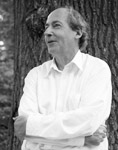
© G. Bompais
"First, a colour. In black, brown and grey blue hues, with from time to time some transparent outbursts of pure light."
Then a rhythm, a regular punctuation, rather slow. A march? Battering ram blows that make the night heavy at the window? And we feel like
"This mysterious noise sounds like a departure"
It is this same stir, this same cadence that we hear in Tchaikowsky or Brahms, Mahler and the three Viennese, funeral but not only that, heavily sombre, poignant.
This colour, this beating, like a bereavement without sadness, are Jean-Claude Wolff's music expressive background. For him, colour is emotional, lyrical, nocturnal - we could say Germanic. The design is precise, sharp - French. The melodic lines, the rhythmic impetus (often complex), the detail as well as the structure itself have a clarity, a liveliness almost, that carries an expressive load that sometimes goes towards violence. We also encounter a sensuality that becomes even more obvious in the last pieces - a sonic warmth akin to a further development of the artistic experience.
Paradoxically, there is in this music a sort of reserve or modesty, of simplicity in the expression that makes us hear even better its secret, its intimate heartbreak. We perceive this silence - or absence - that is at the heart of music probably in the same way it is in literature and in art in general.
No avant-garde dogmatism with Jean-Claude Wolff. No attachment to the past either. His language uses atonality, serialism, various composing processes. Sometimes even the tonality's nostalgic and serene shadow (light?) mixes in. Neither past inheritance nor present demand are left aside. There is in this man the worry, the full and necessary expression - also human that is - of a true artist in the beginning of the 21st century."
Rory NELSON, November 2003